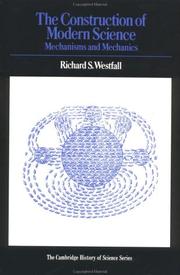| Listing 1 - 1 of 1 |
Sort by
|

ISBN: 0521218632 0521292956 9780521218634 9780521292955 Year: 1986 Publisher: Cambridge: Cambridge university press,
Abstract | Keywords | Export | Availability | Bookmark
 Loading...
Loading...Choose an application
- Reference Manager
- EndNote
- RefWorks (Direct export to RefWorks)
This introduction to the history of science in the seventeenth century examines the so-called 'scientific revolution' in terms of the interplay between two major themes. The Platonic-Pythagorean tradition looked on nature in geometric terms with the conviction that the cosmos was constructed according to the principles of mathematical order, while the mechanical philosophy conceived of nature as a huge machine and sought to explain the hidden mechanisms behind phenomena. Pursuing different goals, these two movements of thought tended to conflict with each other, and more than the obviously mathematical sciences were affected - the influence spread as far as chemistry and the life sciences. As this book demonstrates, the full fruition of the scientific revolution required a resolution of the tension between the two dominant trends.
Mechanics --- Science --- History --- History. --- -Science --- -5/6 (09) --- Natural science --- Science of science --- Sciences --- Classical mechanics --- Newtonian mechanics --- Physics --- Dynamics --- Quantum theory --- Geschiedenis van de exacte en toegepaste wetenschappen --- Natural sciences --- Mechanics - History --- Science - History --- -History --- HISTOIRE DES SCIENCES --- CHIMIE --- NEWTON (SIR ISAAC), MATHEMATICIEN, PHYSICIEN ET ASTRONOME ANGLAIS, 1642-1727 --- TEMPS MODERNES --- HISTOIRE --- SCIENCE
| Listing 1 - 1 of 1 |
Sort by
|

 Search
Search Feedback
Feedback About UniCat
About UniCat  Help
Help News
News